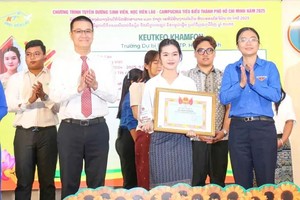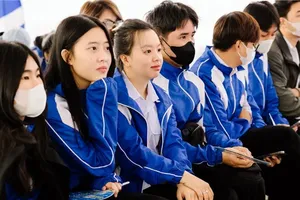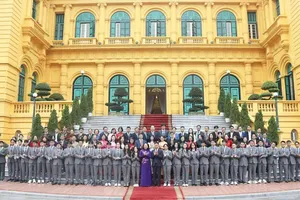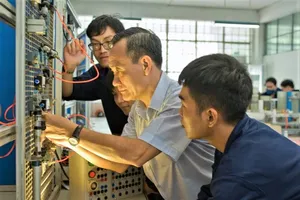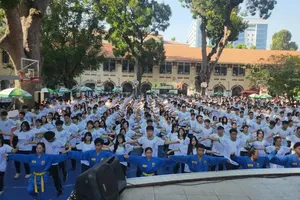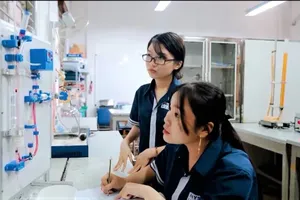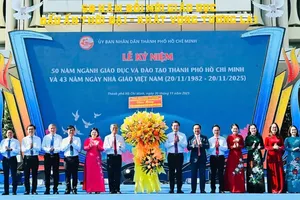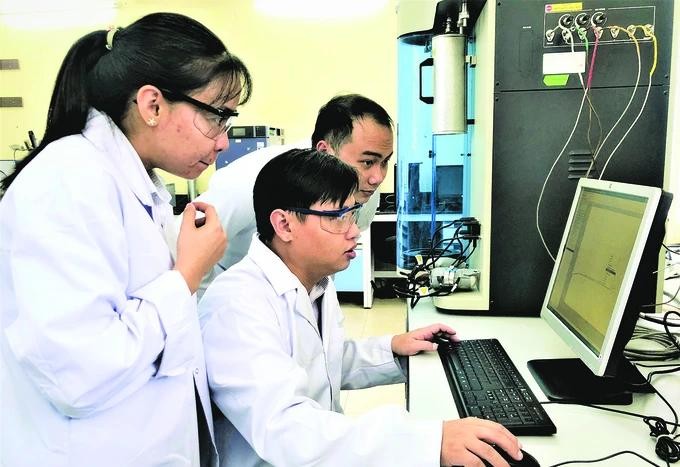
To attract lecturers with good qualifications, many higher educational institutions are offering substantial financial incentives, with bonuses ranging from several hundred million Vietnamese dong to half a billion Vietnamese dong, to professors who accept teaching and research positions.
Demand of university lecturer recruitment is high
In early December 2024, the People's Committee of Hai Phong City presented a document outlining the mechanisms and policies aimed at supporting, attracting, and training highly skilled human resources for Hai Phong University for the period spanning 2024 to 2030.
This region intends to offer a one-time financial incentive to lecturers returning to Hai Phong University, with amounts set at VND500 million (US$19,661) for professors (both domestic and international), VND400 million for associate professors, and VND300 million for doctoral degree holders.
As outlined in the proposal, all recipients of this support are required to commit to a minimum tenure of 5 to 6 years at the university starting from the date they receive the funds.
Meanwhile, elsewhere in Ho Chi Minh City, the University of Finance and Marketing announced a special attraction policy for lecturers to work at the school in March 2024.
In this recruitment round, the school is selecting 43 candidates, including 35 lecturers with advanced degrees, and offers one-time support ranging from VND400 million-VND500 million for professors, VND200 million-VND300 million for associate professors and VND60 million-VND100 million for doctorate holders.
In early 2024, Ho Chi Minh City National University launched the program to attract, retain and develop 350 outstanding young scientists and leading scientists working at Ho Chi Minh City National University -VNU350 program. This is an ambitious initiative designed to attract, retain, and cultivate 350 exceptional young and leading scientists.
This program aligns with the university's overarching vision of establishing itself as a premier research university system within Asia. In terms of compensation, both outstanding young scientists and leading scientists will benefit from comprehensive support packages provided by Ho Chi Minh City National University, complemented by specific incentives offered by each recruiting unit.
For exceptional young scientists, the funding structure is as follows: during the initial two years, they will receive one type C scientific research project with a maximum budget of VND200 million. In the third year, they will be awarded one type B project, which has a maximum budget of VND1 billion. By the fourth year, they will be eligible for laboratory investment support for scientific research, with a maximum budget of VND10 billion.
For leading scientists, the first two years will involve one type B scientific research project, with a maximum budget of VND1 billion. In subsequent years, they will receive support for laboratory investments, with a maximum budget of VND30 billion as well as assistance in forming robust research teams and opportunities to lead projects at various levels.
Many non-public universities such as have participated in this race to lure good lecturers. These schools spend hundreds of millions of Vietnamese dong to attract lecturers with doctoral degrees or higher to work at schools.
Schools expand policies to attract talents
A representative from VNU-HCM stated that the VNU350 program aims to draw in talented individuals and top experts. The initiative seeks to engage leading scientists to oversee scientific and technological projects, thereby fostering the growth of robust research teams, rather than merely collaborating for the sake of producing international publications.
VNU-HCM's long-term systematic investment attraction policy aligns with its development strategy and will implement suitable mechanisms tailored to individual cases.
Principal Phan Hong Hai of Ho Chi Minh City University of Industry, stated that the institution compensates newly appointed PhDs in accordance with Government regulations. Specifically, these individuals begin with a salary coefficient of 3.0 and receive an additional monthly support of VND7 million if they have published a scientific article, resulting in a total monthly income of approximately VND13 million. Consequently, a newly graduated PhD can earn over VND25 million per month.
PhD candidates invited to join the faculty will receive a recruitment bonus of VND100 million. However, attracting and retaining high-quality lecturers and scientists requires a multifaceted approach. Before returning to the institution, potential candidates will have the opportunity to assess the school's research priorities and working conditions to ensure an environment conducive to their professional development.
Prior to its integration with VNU-HCM, An Giang province initiated a program to develop high-level human resources through tuition fee subsidies, as noted by Associate Professor Vo Van Thang, Principal of An Giang University (VNU-HCM). However, the program yielded minimal results, with only a single participant who did not return to the province after completing their studies. Dr. Thang emphasized the persistent difficulties encountered by local governments and universities in effectively addressing the critical need for highly qualified personnel.
The school has introduced the VNU350 program, which offers a reward of VND60 million to a lecturer. However, to successfully recruit candidates, the institution must provide clear commitments along with various conditions, as financial incentives alone are insufficient to draw in potential applicants.
